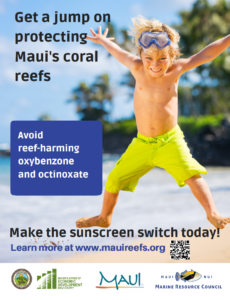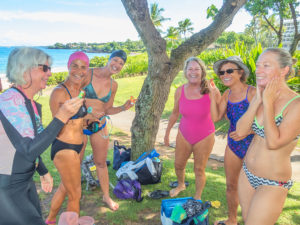New Campaign Urges Maui Visitors to “Get a Jump on Protecting Maui’s Coral Reefs” by Making the Sunscreen Switch Today
KIHEI, HI — Hawaii’s recently passed sunscreen law (HI SB 2571) doesn’t go into effect until January 1, 2021, but a Maui-based marine conservation organization is launching an educational campaign to urge visitors and residents to “Get a Jump on Protecting Maui’s Coral Reefs” by switching to environmentally friendly sunscreen products now.
Maui Nui Marine Resource Council (MNMRC) is a Maui-based nonprofit celebrating 10 years of working for healthier coral reefs, clean ocean water and abundant native fish for the islands of Maui, Molokai, and Lana’i.
Maui Visitors Bureau and the County of Maui Mayor’s Office of Economic Development are supporting partners of MNMRC’s sunscreen educational campaign.
The campaign will be launched in November and will use social media, public service announcements, news releases and other outreach to urge visitors and residents to protect Maui County’s reefs by avoiding the use of sunscreen products that contain oxybenzone and octinoxate, two chemicals known to be toxic to corals and other marine life.
“The sale of sunscreens containing oxybenzone and octinoxate will be banned under Hawaii’s sunscreen law in 2021, but why wait until then?,” said Robin Newbold, co-founder and chair of Maui Nui Marine Resource Council. “Coral reefs in Hawaii and around the world are under stress due to warming ocean waters, sediment runoff, pollution and other human-related causes. While it’s important that we tackle those issues, switching to a more environmentally friendly sunscreen now is an easy way for individuals and families to help protect the reefs.”
Newbold noted that new sunscreen products made without oxybenzone and octinoxate are readily available and easy to use.
 “Please read the labels before you purchase sunscreen for your trip to Maui, and avoid those products with octinoxate and oxybenzone,” said Amy Hodges, Programs Manager at Maui Nui Marine Resource Council. “Look instead for mineral-based sunscreens featuring titanium dioxide or zinc oxide. Read the labels carefully so you know how much to apply and when to reapply for ideal protection. Options such as hats, rash guards and swim tights, available online and at Maui stores, can also protect your skin and dramatically reduce the amount of sunscreen that you need to apply.”
“Please read the labels before you purchase sunscreen for your trip to Maui, and avoid those products with octinoxate and oxybenzone,” said Amy Hodges, Programs Manager at Maui Nui Marine Resource Council. “Look instead for mineral-based sunscreens featuring titanium dioxide or zinc oxide. Read the labels carefully so you know how much to apply and when to reapply for ideal protection. Options such as hats, rash guards and swim tights, available online and at Maui stores, can also protect your skin and dramatically reduce the amount of sunscreen that you need to apply.”
Sunscreen users are also urged to skip spray-on products, which can leave residues on beach sand that eventually get washed into the ocean. Apply sunscreen at least 20 to 30 minutes before entering the ocean, to reduce the amount that washes off into the water.
The Hawaii bill, signed into law in July by Hawaii Governor David Ige, points out the issues with oxybenzone and octinoxate, stating “the legislature finds that two chemicals contained in many sunscreens, oxybenzone and octinoxate, have significant harmful impacts on Hawaii’s marine environment and residing ecosystems, including coral reefs that protect Hawaii’s shoreline. Oxybenzone and octinoxate cause mortality in developing coral; increase coral bleaching that indicates extreme stress, even at temperatures below 87.8 degrees Fahrenheit; and cause genetic damage to coral and other marine organisms. These chemicals have also been shown to degrade corals’ resiliency and ability to adjust to climate change factors and inhibit recruitment of new corals. Furthermore, oxybenzone and octinoxate appear to increase the probability of endocrine disruption.”
Even in tiny amounts, oxybenzone quickly bleaches coral and impedes their growth. A single drop in 4.3 million gallons of water — about six and a half Olympic-size swimming pools — can be deadly to corals.
 An estimated 14,000 tons of sunscreen lotions end up in ocean waters around coral reefs around the world each year.
An estimated 14,000 tons of sunscreen lotions end up in ocean waters around coral reefs around the world each year.
Even if you live away from the ocean, chemicals from your sunscreen will wash off your body and eventually find their way into the water table and ultimately into the ocean.
Maui Nui Marine Resource Council asks that you choose to be sunscreen smart wherever you live, to do your part to protect your skin and coral reefs.
For helpful tips on making the sunscreen switch, visit https://www.mauireefs.org/10-ways-become-sunscreen-smart/
To learn more about Maui Nui Marine Resource Council, visit www.mauireefs.org.
About Maui Nui Marine Resource Council:
A Maui-based nonprofit organization founded in 2007, Maui Nui Marine Resource Council is working for healthy coral reefs, clean ocean water and abundant native fish for the islands of Maui County. Current projects include ocean water quality testing in South and West Maui, work to improve ocean water quality in Ma’alaea Bay, ongoing studies of corals in Olowalu and Ma’alaea, and outreach programs to educate visitors about protecting Maui’s coral reefs.
Photo credit:
“Swimmers testing out reef-safe sunscreens” courtesy Don Bloom, Tropical Light Photography



No Comments
Sorry, the comment form is closed at this time.